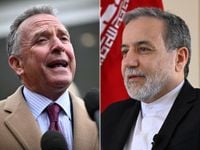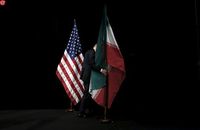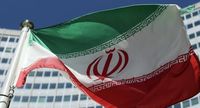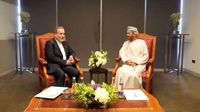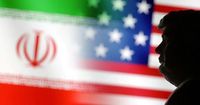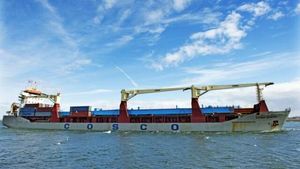Iran and the United States have commenced high-stakes nuclear negotiations in Muscat, Oman, amid rising tensions and threats of military action from U.S. President Donald Trump. The talks, which began on April 12, 2025, are seen as a crucial step in addressing Tehran's rapidly advancing nuclear program, a point of contention that has persisted for over two decades.
Leading the Iranian delegation is Foreign Minister Seyed Abbas Araghchi, who has been granted full authority by Iran’s Supreme Leader, Ayatollah Ali Khamenei. The U.S. side is represented by Special Envoy for the Middle East, Steve Witkoff. The format of the discussions remains a contentious issue, with the U.S. advocating for direct talks while Iran insists on an indirect approach, mediated by Oman.
Upon his arrival in Muscat, Araghchi expressed optimism about reaching a "fair and dignified agreement" if both sides approach the negotiations with sincerity. He emphasized that the focus will solely be on nuclear issues, stating, "The nuclear topic, which means making transparency and giving assurances about the peaceful nature of Iran’s nuclear program in exchange for the removal of the cruel sanctions, will be the only topic of the talks." He also noted that the success of the negotiations depends on the U.S. demonstrating genuine willingness to engage.
The backdrop to these discussions includes a letter from President Trump proposing direct nuclear talks, which Iran declined, opting instead for indirect negotiations. Trump has been vocal about his desire for a more favorable deal than the Joint Comprehensive Plan of Action (JCPOA), which he deemed a "horrible, one-sided agreement" before withdrawing the U.S. from it in 2018. Analysts have pointed out that the current negotiations are likely to be more challenging than the JCPOA discussions.
Trump reiterated his position on the nuclear threat posed by Iran, stating, "I want them not to have a nuclear weapon. I want Iran to be a wonderful, great, happy country, but they can’t have a nuclear weapon." His administration has signaled that there will be "all hell to pay" if Iran does not comply with U.S. demands. Secretary of State Marco Rubio echoed this sentiment, asserting, "We’ve been very clear what Iran is never going to have: a nuclear weapon."
Iran's delegation includes several high-ranking diplomats, and the country has made it clear that it will not negotiate its defense capabilities, particularly its ballistic missile program. This insistence reflects Iran's long-standing position that its nuclear program is intended solely for peaceful purposes, such as energy generation and medical applications.
Despite the tensions, both sides have hinted at potential progress. Araghchi noted that there is a chance for an initial understanding if the U.S. enters the talks with an equal stance. However, Iran remains skeptical about the prospects for a deal, particularly given Trump's history of military threats against the nation. Just days before the talks began, Trump warned that if an agreement is not reached, military action would be on the table.
Tehran's regional influence has diminished significantly in recent months, particularly following the ongoing conflicts in Gaza and Lebanon, which have weakened its allies. The Iranian economy has also suffered under the weight of sanctions imposed after the U.S. exited the JCPOA. The Iranian rial has plummeted, and the country is facing severe economic challenges, with many citizens feeling the impact of these sanctions.
In the lead-up to the negotiations, Iranian officials have emphasized the need for a "real and fair" agreement, with proposals ready for discussion. Ali Shamkhani, an advisor to Khamenei, stated that Tehran is prepared to engage in serious negotiations but remains wary of the U.S. approach, which it views as historically non-committal and unilateral.
The European Union has also weighed in, with officials asserting that there is "no alternative to diplomacy" in resolving the ongoing nuclear dispute. Germany has urged both parties to strive for a diplomatic solution, while China and Russia, as signatories to the original deal, have expressed opposition to Western pressure on Iran.
As the talks unfold, observers are cautious about expectations. James Bays, Al Jazeera’s diplomatic editor, remarked, "The important thing is that the talks don’t completely collapse and that a process can be started." The stakes are high, and the outcome of these discussions could have far-reaching implications for regional stability and global security.
In summary, the negotiations in Oman represent a critical juncture in U.S.-Iran relations, with both sides navigating a complex landscape of threats, sanctions, and historical grievances. The world watches closely as these high-level talks unfold, hoping for a breakthrough that could alleviate tensions and pave the way for a more stable future.
